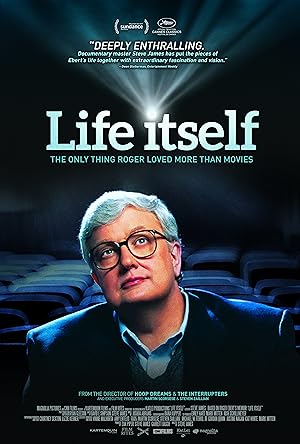
Life Itself Page #5
That may be true,
but this movie is made
on such an epic scale.
And because
they could get agitated,
that raised the temperature of
the movies they were discussing.
Tremendously boring,
boring from the beginning
of the movie.
- I just wanna compare this film...
- Oh, no. Wait a minute.
- Now he's not boring at all.
- Oh, yes. Fabulously boring.
- He is fabulously boring?
- I would pass...
There was something almost
transgressive and exciting
about seeing on TV
somebody say about a movie,
you know what you might always
want to say to your friend,
or your girlfriend
or your mother or your sister,
"No, you're wrong.
It's not a good movie."
That's the way
people do relate to films,
is in that argumentative
sort of way,
in which if you're right nobody
can tell you that you're wrong.
I sit at the desk next to our
music critic at the Sun-Times.
People are very worshipful of him.
"Oh, what did you think about
Shulty's conducting last night?"
And then he will say, and they
will nod like this and go away.
And then they'll turn around
and come up to me and say,
"I totally disagree with your review
in this morning's paper."
The success of the show
was undeniable,
except we were not on
in two major markets:
New York and Los Angeles.
Here I am
at the little popcorn shop
a half a block from the screening
room where I see all the movies.
This is the Chicago Theater
on State Street.
Their position was,
if there's gonna be a movie show,
it's not gonna be
two guys from Chicago.
We're gonna have New York critics,
or we're Hollywood.
Who are these guys, right?
This is not Andrew Sarris,
and Pauline Kael.
And it's also not
the kind of, the wised up players
who might be in Los Angeles.
What do these people
have to tell us about movies?
on the scene shook everything up.
The New Yorker recognized that
maybe this was the time for
a new kind of movie criticism.
Suddenly movie critics
become new players in the game.
You weren't crazy
about Prince of the City.
No. Prince of the City.
I thought, it really,
as a piece of narrative,
it's almost a case study
in confusion.
Kael's influence shaped
how critics looked at movies...
...and how people read them.
Film was taken seriously
and so were film critics.
Andrew Sarris was promoting
the idea of the director
as the maker of the film,
and Pauline Kael,
elevating film writing,
film criticism as an art.
But these were
towering figures, clashing.
Rather like Siskel and Ebert,
but with more intellectual heft.
Uh-oh, Gene.
This bowser in the balcony
means it's time
for Dog Of The Week.
A regular feature where each of us
picks the week's worst movie.
Well, Roger, you and Spot
may not believe this,
but I have just seen
my first nudie karate film.
- You're kidding.
- No.
Roger once said,
"Do you think Pauline Kael
would be working with a dog?"
I don't know Pauline Kael,
I never knew Pauline Kael.
But f*** Pauline Kael.
Roger Ebert and Gene Siskel
were the most powerful critics
of all time.
In any realm.
Finally, they had to cave in
and run the show
in New York and L.A.
It was a victory we relished,
I have to tell you.
Here to help us sort
the blockbusters from the bombs
are the team At the Movies,
Gene Siskel and Roger Ebert.
You guys live in Chicago still,
down there in Oprah-land?
What I'd like to do
is come to Chicago one night
and we'll just go nuts.
We'll just get stinking drunk.
We'll go out
and eat steaks all night.
My next two guests are
regarded as the most popular
and most important film critics
in the country.
They are the two most influential
movie critics in the country.
Is there anybody more popular?
We'll find out and ask them.
And ultimately,
I think they were
on the Johnny Carson Show
more than just about anybody.
Is there something out there
that is really so bad?
Roger?
I can't really recommend
Three Amigos.
It's the Christmas picture
I like the least.
- This is the happy hour.
- Yes.
I don't think I'd ask you if
I knew you were gonna say that.
Chevy Chase has made
a lot of good movies,
and God willing, he will make a lot
more good movies in the future.
- With your help.
- Yes, well, I...
Yes, with your help.
There is a tendency
for somebody...
...who is naturally funny,
as Chevy is,
to try to get laughs
by standing there
and ad-libbing
when somebody else
is trying to talk.
That's right.
The movie studios
went from helping us...
to hating us, to fearing us.
The circulations of all
of the newspaper critics,
and all of the magazines,
could not match
the reach of the show
at its height.
It became quite clear
very often
that the film companies cared a lot
about Roger and Gene seeing it,
but not so much
about the rest of us.
Two thumbs up became
everything for a Hollywood movie.
Back when moviemakers
still thought
critics' enthusiasm
could sell a movie.
In 1991,
Richard Corliss published
a piece in Film Comment
about how the show
was ruining and vulgarizing
film criticism.
"Will anyone
read this story?
It has too many words
and not enough pictures.
Does anyone read this magazine?
Every article in it wants
to be a meal, not a McNugget.
Is anyone reading film criticism?
It lacks punch,
the clips, the thumbs.
I simply don't want people to think
that what they have to do on TV
is what I am supposed
to do in print.
I don't want junk food to be
the only cuisine at the banquet."
Yeah, etcetera.
Uh... I really did sound angry there,
but it seemed to me that
the Siskel-Ebert effect
was that a film
was either good or bad
and the rest
didn't matter so much.
I am the first
to agree with Corliss
that the Siskel and Ebert program
is not in depth film criticism.
As indeed, how could it be,
given our time constraints.
But we would have to do it
for our own amusement
because nobody would play it
on television.
The program's purpose
is to provide
exactly what Corliss
says it provides:
information on what's new
at the movies, who's in it,
and whether the critic thinks
it's any good or not.
If you're talking about
film criticism in a serious way,
consumer advice is not
the same thing as criticism.
To assume that something
is good for everybody,
or bad for everybody
is insulting to everybody.
The subject of Crash
left me feeling empty.
Crash has some
beautiful bodies on view,
but also some ugly ideas.
The car crash is a fertilizing
rather than a destructive event.
When we have
an opinion about a movie,
that opinion may light
a bulb over the head
of an ambitious youth
who then understands
that people can make up
their own minds about the movies.
I think I liked the movie
a lot more than you did.
I'd like to make it clear
that most people are probably
going to hate it, be repelled
by it or walk out of it,
just as they did at
the Cannes Film Festival.
- Why is that?
Translation
Translate and read this script in other languages:
Select another language:
- - Select -
- 简体中文 (Chinese - Simplified)
- 繁體中文 (Chinese - Traditional)
- Español (Spanish)
- Esperanto (Esperanto)
- 日本語 (Japanese)
- Português (Portuguese)
- Deutsch (German)
- العربية (Arabic)
- Français (French)
- Русский (Russian)
- ಕನ್ನಡ (Kannada)
- 한국어 (Korean)
- עברית (Hebrew)
- Gaeilge (Irish)
- Українська (Ukrainian)
- اردو (Urdu)
- Magyar (Hungarian)
- मानक हिन्दी (Hindi)
- Indonesia (Indonesian)
- Italiano (Italian)
- தமிழ் (Tamil)
- Türkçe (Turkish)
- తెలుగు (Telugu)
- ภาษาไทย (Thai)
- Tiếng Việt (Vietnamese)
- Čeština (Czech)
- Polski (Polish)
- Bahasa Indonesia (Indonesian)
- Românește (Romanian)
- Nederlands (Dutch)
- Ελληνικά (Greek)
- Latinum (Latin)
- Svenska (Swedish)
- Dansk (Danish)
- Suomi (Finnish)
- فارسی (Persian)
- ייִדיש (Yiddish)
- հայերեն (Armenian)
- Norsk (Norwegian)
- English (English)
Citation
Use the citation below to add this screenplay to your bibliography:
Style:MLAChicagoAPA
"Life Itself" Scripts.com. STANDS4 LLC, 2025. Web. 4 Mar. 2025. <https://www.scripts.com/script/life_itself_12550>.







Discuss this script with the community:
Report Comment
We're doing our best to make sure our content is useful, accurate and safe.
If by any chance you spot an inappropriate comment while navigating through our website please use this form to let us know, and we'll take care of it shortly.
Attachment
You need to be logged in to favorite.
Log In